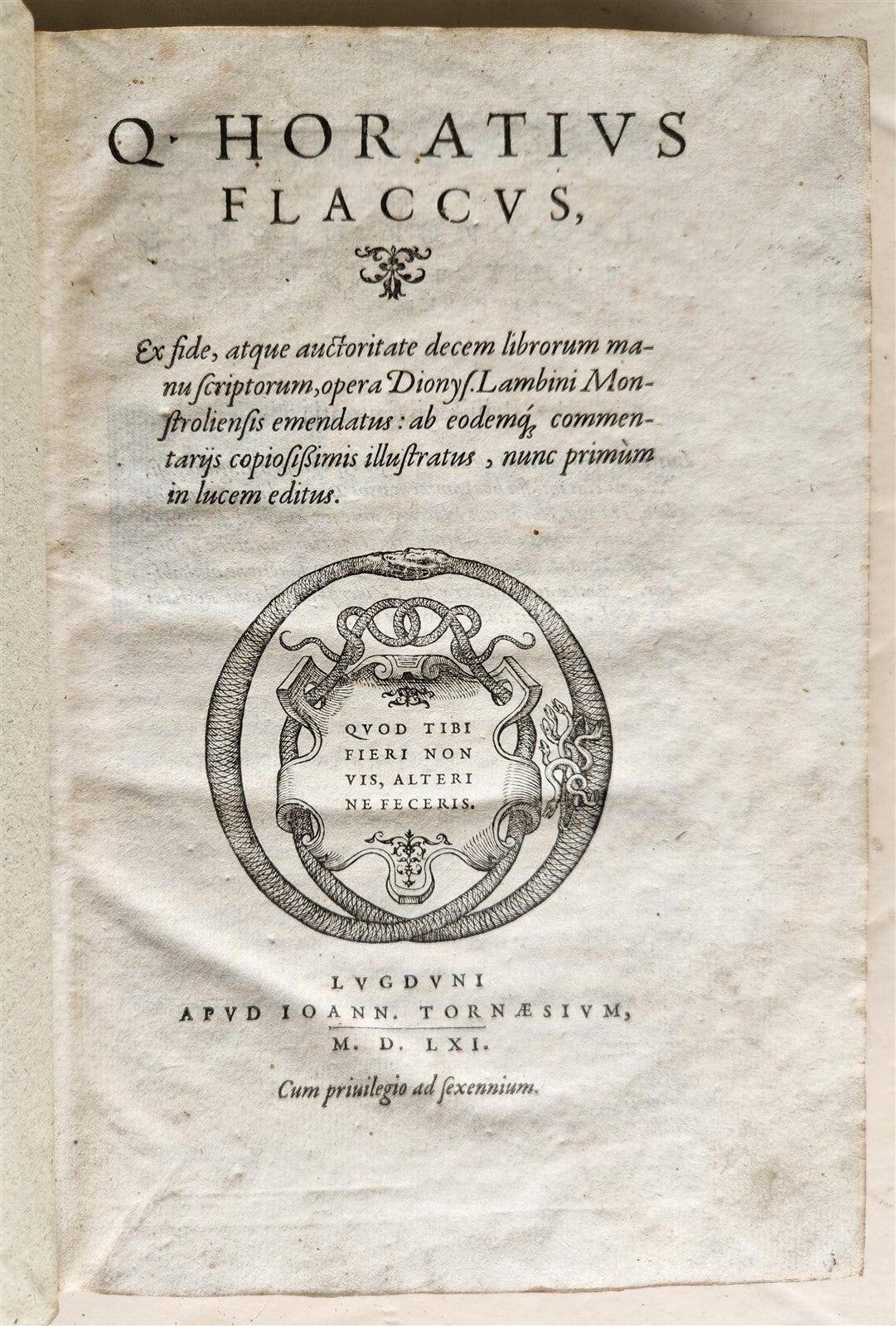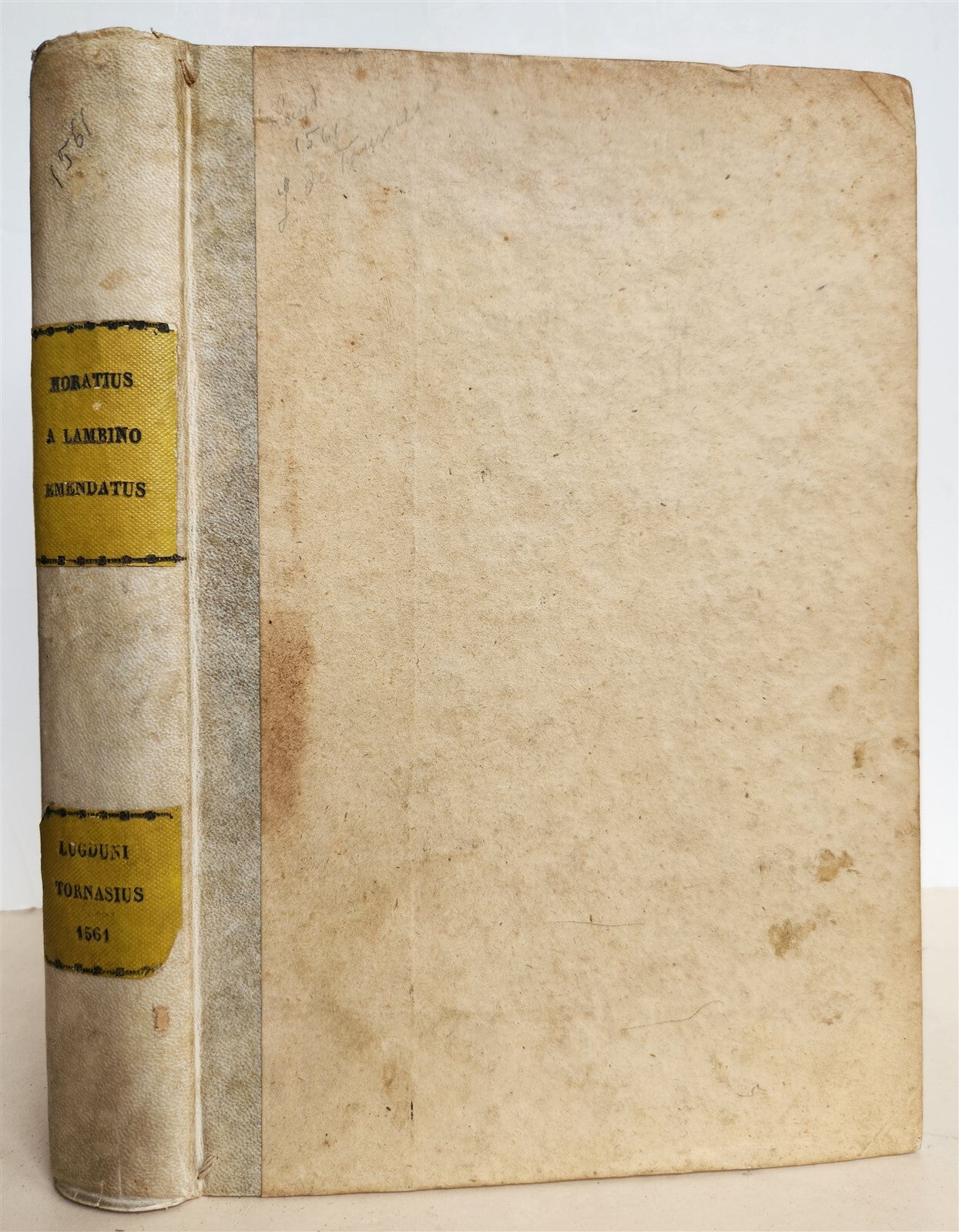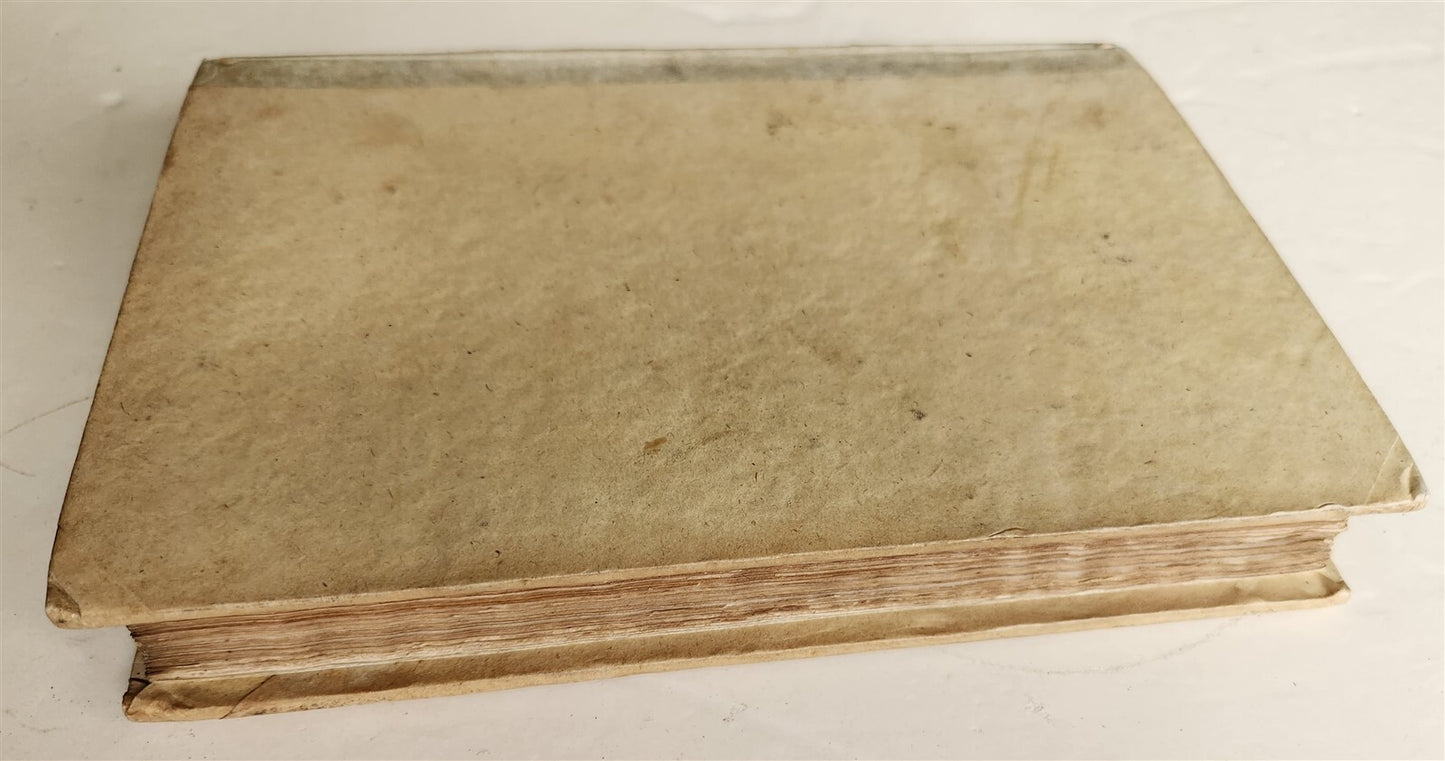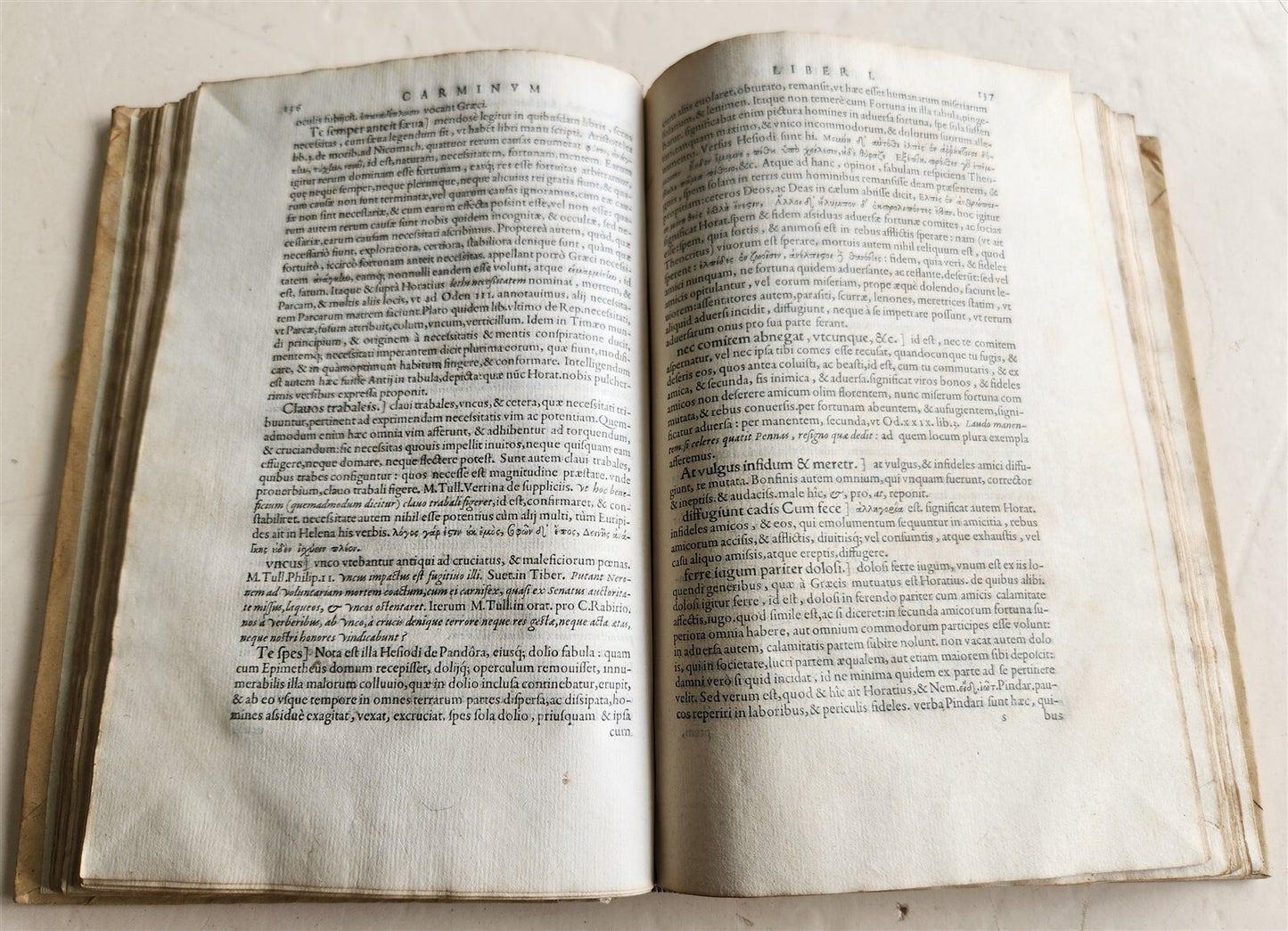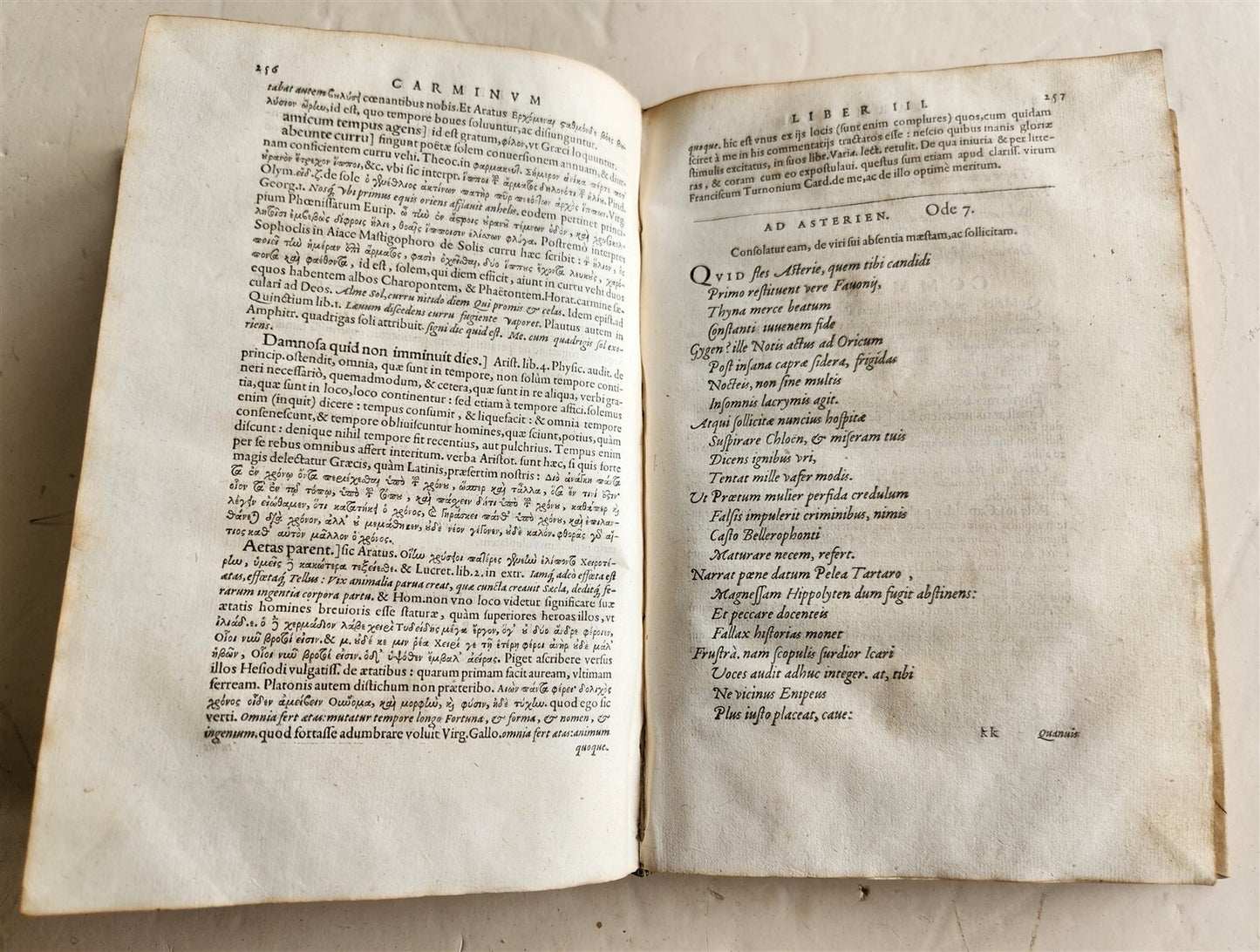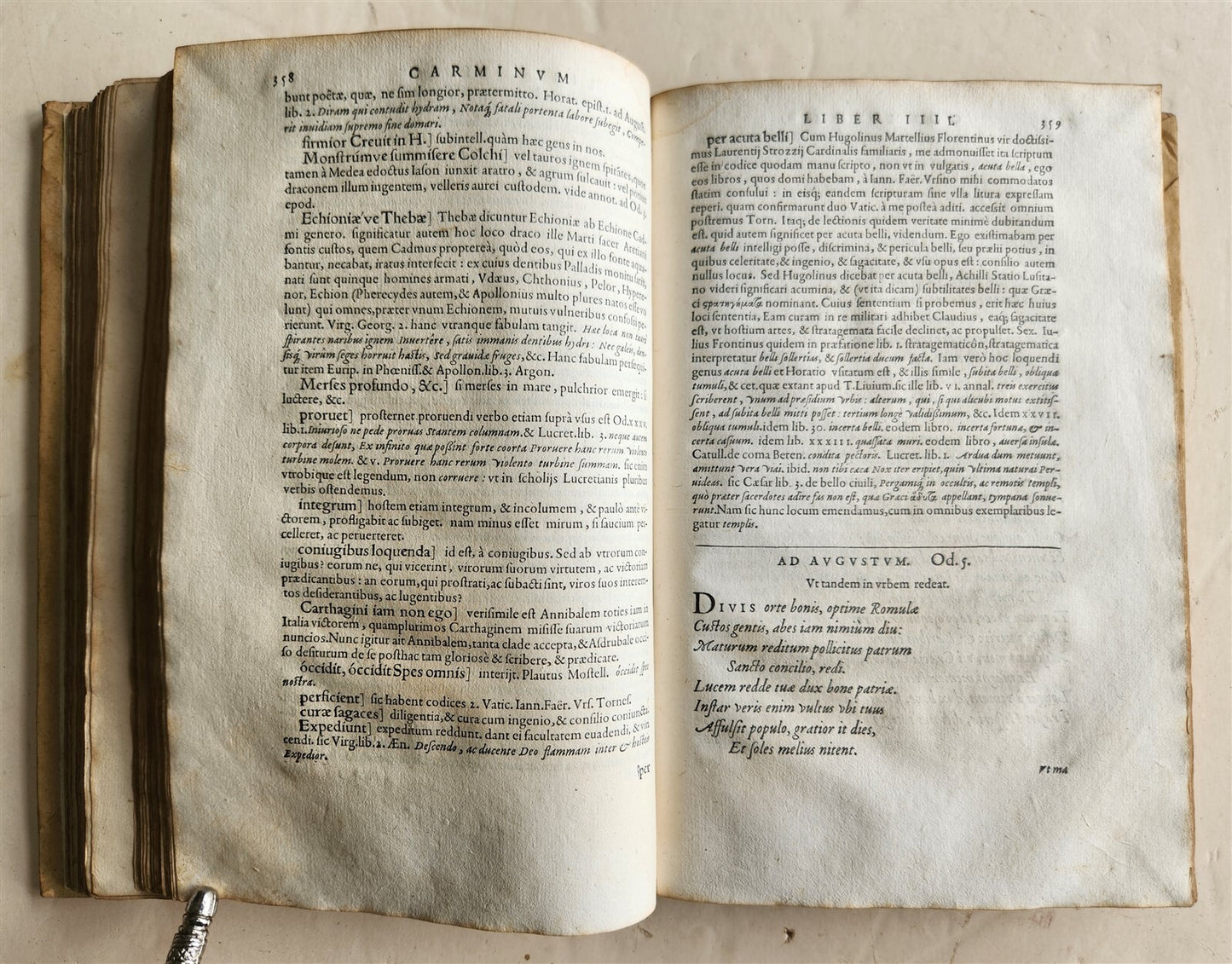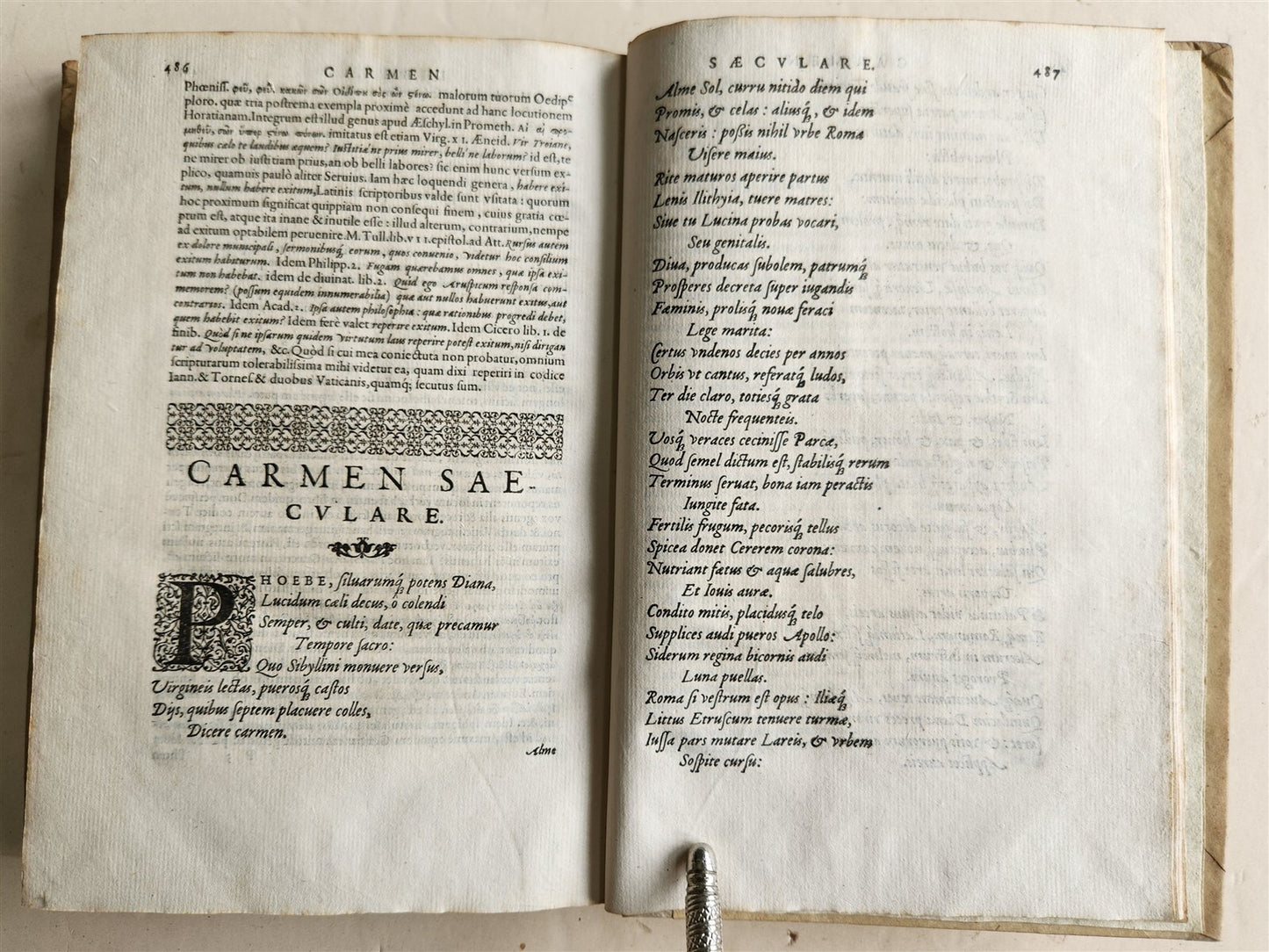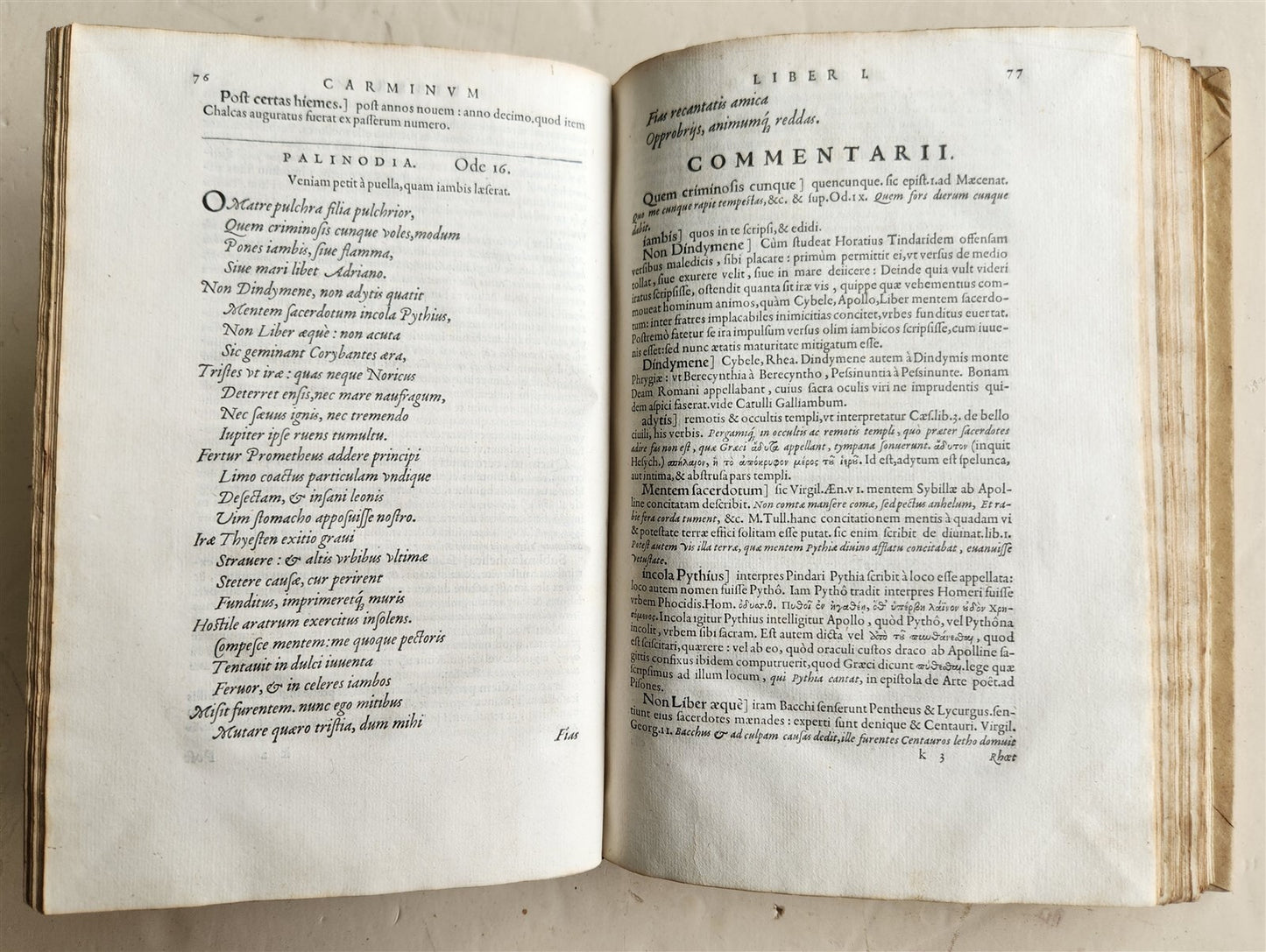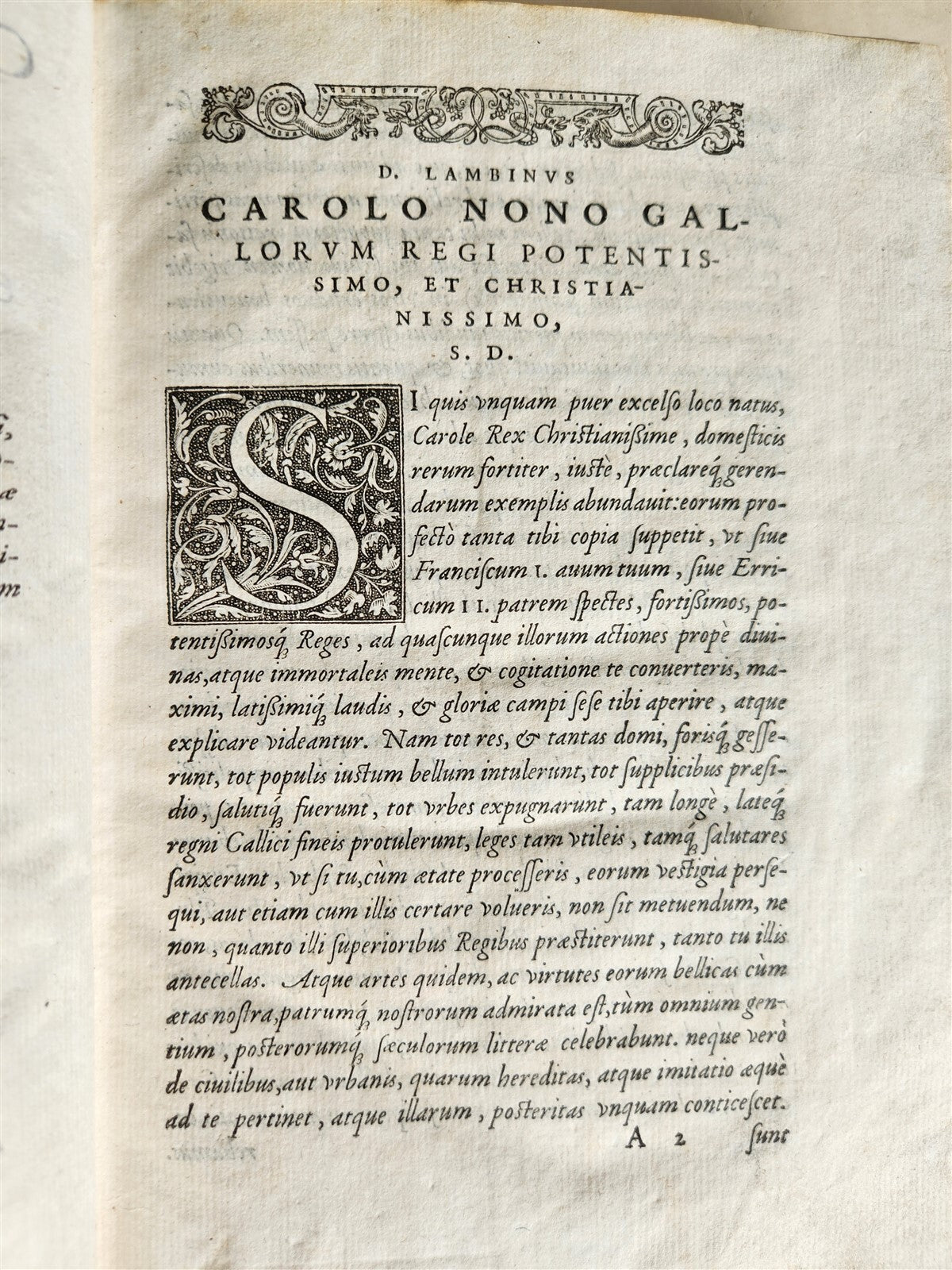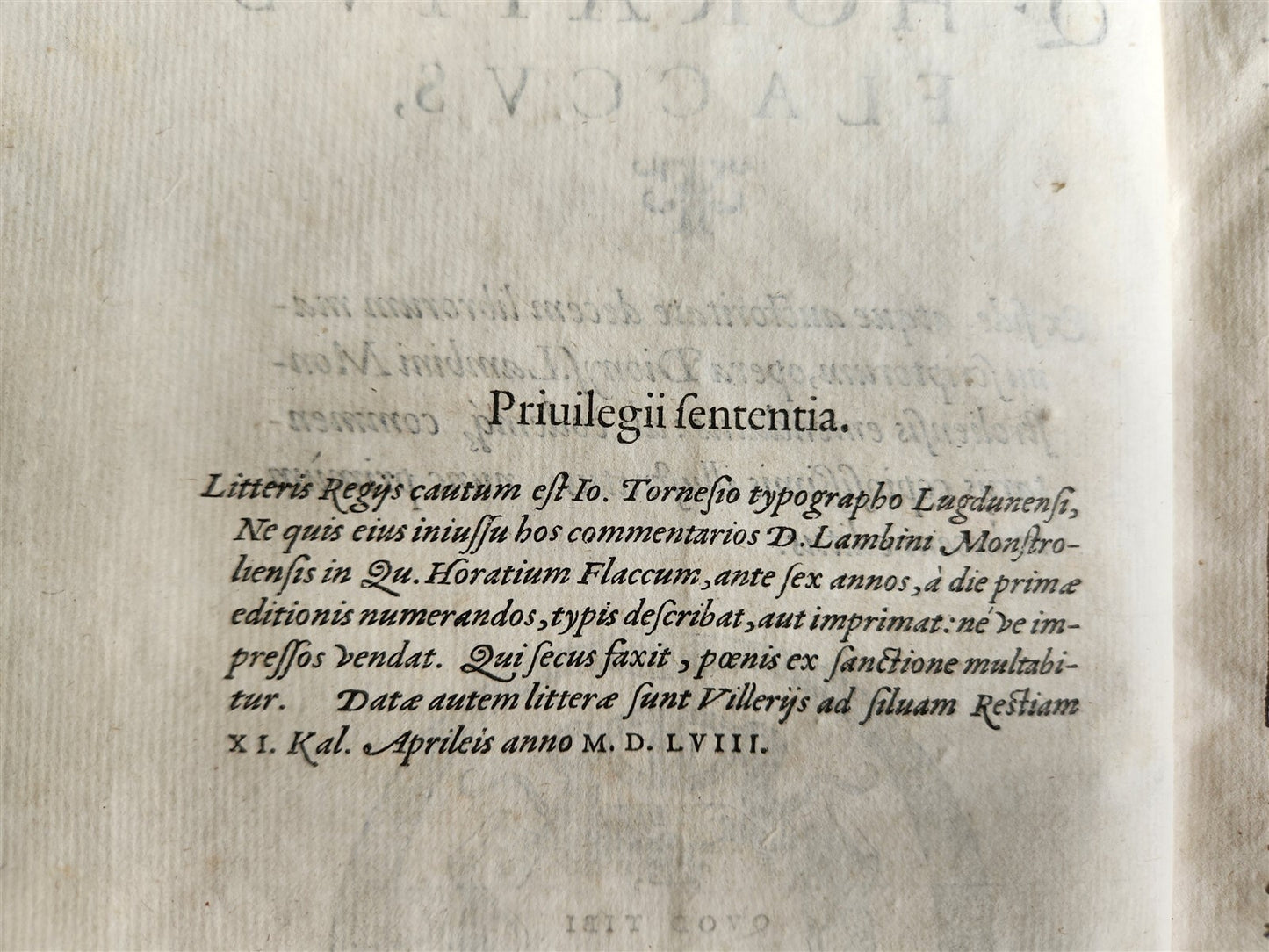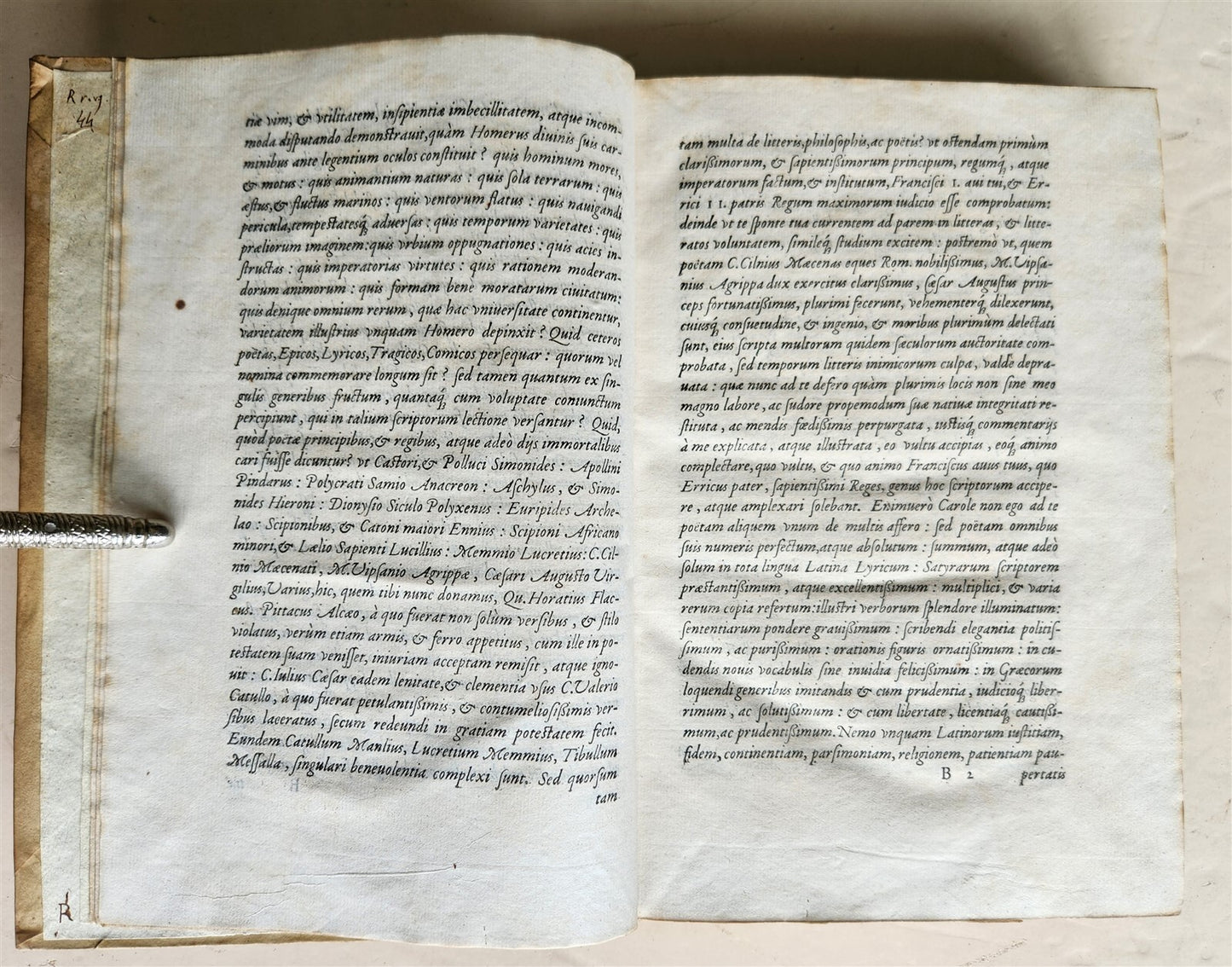Motka
1561 HORACE COMMENTARY by DIONISIO LAMBINO antique POETRY VELLUM 16th CENTURY
1561 HORACE COMMENTARY by DIONISIO LAMBINO antique POETRY VELLUM 16th CENTURY
Regular price
$449.40 USD
Regular price
$642.00 USD
Sale price
$449.40 USD
Unit price
per
Couldn't load pickup availability
Q. HORATIUS FLACCUSEx fide, atque auctoritate decem librorum manuscriptorum, opera Dionys. Lambini Monstroliensis emendatus: ab eodemque commentariis copiosissimis illustratus, nunc primum in lucem editus.by Quintus Horatius Flaccus / Dionysius LambinusLugduni, Ioann. Tornaesium; 1561THE CRITICAL EDITION by DIONISIO LAMBINOThis 1561 edition represents a milestone in the history of Horatian studies. Dionisio Lambino, a well-known humanist of the 16th century, edited this edition, emending the text on the basis of ten manuscripts and enriching it with extensive commentaries. The work presents itself as a critical edition, the result of careful philological work by Lambino, who sought to establish the text as close to the original as possible. The text is presented in both Greek and Latin, reflecting the importance of classical culture in the Renaissance. Quintus Horatius Flaccus is one of the most important Latin poets, celebrated for his stylistic elegance and the depth of his themes. Dionisio Lambino was a French humanist and philologist, known for his studies of the Latin classics.Lather vellum binding with title labels to the spineVery good conditionSize 6 3/4 by 9 3/4 inchesText in Latin with some Greek=================Quintus Horatius Flaccus, more simply known as Horace (in Latin Quintus Horatius Flaccus; Venosa, 8 December 65 BC – Rome, 27 November 8 BC), was a Roman poet. Horace was born on 8 December 65 BC in Venosa, a Roman colony founded in a strategic position between Apulia and Lucania, then in Daunia territory and currently in Basilicata. He was the son of a freedman who later moved to Rome to work as a collector of public auctions (coactor auctionarius), a job that was not highly regarded but profitable; the poet was therefore of humble origins, but of good economic condition.He received his first notions of fables from his nurse Pullia, who loved to tell fairy tales. After spending his childhood in his native land, Horace followed a regular course of studies in Rome, under the teaching of the grammarian Orbilius and then in Athens, at the age of about twenty, where he studied Greek and philosophy with Cratippus of Pergamon. Here he came into contact with the Epicurean teaching, but, although he felt particularly attracted to it, he decided not to join the school. It was within the Roman environment that Horace joined the movement, which allowed him to find a refuge in contemplative otium. The poet expressed his gratitude towards his father in a tribute in the Satires (I, 6).After the death of Caesar, when the civil war broke out, Horace enlisted in Brutus' army, in which the poet embodied his ideal of freedom in antithesis to the prevailing tyranny. He fought as a military tribune in the republican army commanded by Brutus in the battle of Philippi (42 BC), lost by Brutus' supporters and won by Mark Antony and Octavian. In this battle Brutus and Cassius perished, while Horace fled after the second battle, as he himself confesses in one of his odes, in which he says that he had already found himself in some other very dangerous actions. An innovative reading of the battle was proposed by Giuliano Pisani.In 41 BC he returned to Italy thanks to an amnesty and, having learned of the confiscation of his father's farm, he supported himself by becoming secretary to a quaestor (scriba quaestorius). In this period he began to write verses, which began to give him a certain notoriety. In 38 BC he was introduced to Maecenas by Virgil and Varius, probably met in the context of the Epicurean schools of Sirone, near Naples and Herculaneum. After nine months Maecenas admitted him into his circle and from then on the poet was able to devote himself entirely to literature, he never married and had no children. Already in this period Horace was found to have weak eyes, having contracted conjunctivitis.In 33 BC, Maecenas donated to him a small estate in Sabina, the ruins of which can still be visited today near Licenza (RM). The gift was very welcome to the poet who, in perfect observance of the modus vivendi preached by Epicurus, did not like city life.With his poetry, Horace supported the figure and politics of the emperor Augustus, who in this period left great freedom of composition to his poets (a tendency that would however be reversed after the death of Maecenas: as witnessed by the biographical story of Ovid). Examples of Augustan propaganda are, in any case, some Odes and the Carmen saeculare, composed in 17 BC on the occasion of the anniversary of the Ludi Saeculares. Horace died on November 27, 8 BC and was buried on the Esquiline Hill, next to his friend Maecenas, who had died only two months earlier.================Please see my other auctions Thank You
Refund Policy: We will issue a FULL REFUND, 100% money back if you are not satisfied with your purchase. Items must be returned to us within 20 days in order to receive a refund or replacement. Buyer is responsible for shipping costs.
------------------------------------------------------------------------------------------------------------------------------------------------------------------------------------------------------------------------------------------------------------------------------------------------------------------------------------------------------------------------------------------------------------------------------------------------------------------------------------------------------------------------------------------------------------------------------------------------------------------------------------------------------------------------------------------------------------------------------------------------------------------------------------------------------------------------------------------------------------------------------------------------------------------------------------------------------------------------------------------------------------------------------------------------------------------------------------------------------------------------------------------------------------------------------------------------------------------------------------------------------------------------------------------------------------------------------------------------------------------------------------------------------------------------------------------------------------------------------------------------------------------------------------------------------------------------------------------------------------------------------------------------------------------------------------------------------------------------------------------------------------------------------------------------------------------------------------------------------------------------------------------------------------------------------------------------------------------------------------------------------------------------------------------------------------------------------------------------------------------------------------------------------------------------------------------------------------------------------------------------------------------------------------------------------------------------------------------------------------------------------------------------------------------------------------------------------------------------------------------------------------------------------------------------------------------------------------------------------------------------------------------------------------------------------------------------------------------------------------------------------------------------------------------------------------------------------------------------------------------------------------------------------------------------------------------------------------------------------------------------------------------------------------------------------------------------------------------------------------------------------------------------------------------------------------------------------------------------------------------------------------------------------------------------------------------------------------------------------------------------------------------------------------------------------------------------------------------------------------------------------------------------------------------------------------------------------------------------------------------------------------------------------------------------------------------------------------------------------------------------------------------------------------------------------------------------------------------------------------------------------------------------------------------------------------------------------------------------------------------------------------------------------------------------------------------------------------------------------------------------------------------------------------------------------------------------------------------------------------------------------------------------------------------------------------------------------------------------------------------------------------------------------------------------------------------------------------------------------------------------------------------------------------------------------------------------------------------------------------------------------------------------------------------------------------------------------------------------------------------------------------------------------------------------------------------------------------------------------------------------------------------------------------------------------------------------------------------------------------------------------------------------------------------------------------------------------------------------------------------------------------------------------------------------------------------------------------------
Q. HORATIUS FLACCUS
Ex fide, atque auctoritate decem librorum manuscriptorum, opera Dionys. Lambini Monstroliensis emendatus: ab eodemque commentariis copiosissimis illustratus, nunc primum in lucem editus.
by Quintus Horatius Flaccus / Dionysius Lambinus
Lugduni, Ioann. Tornaesium; 1561
THE CRITICAL EDITION by DIONISIO LAMBINO
This 1561 edition represents a milestone in the history of Horatian studies.
Dionisio Lambino, a well-known humanist of the 16th century, edited this edition, emending the text on the basis of ten manuscripts and enriching it with extensive commentaries. The work presents itself as a critical edition, the result of careful philological work by Lambino, who sought to establish the text as close to the original as possible. The text is presented in both Greek and Latin, reflecting the importance of classical culture in the Renaissance. Quintus Horatius Flaccus is one of the most important Latin poets, celebrated for his stylistic elegance and the depth of his themes. Dionisio Lambino was a French humanist and philologist, known for his studies of the Latin classics.
Lather vellum binding with title labels to the spine
Very good condition
Size 6 3/4 by 9 3/4 inches
Text in Latin with some Greek
=================
Quintus Horatius Flaccus, more simply known as Horace (in Latin Quintus Horatius Flaccus; Venosa, 8 December 65 BC – Rome, 27 November 8 BC), was a Roman poet. Horace was born on 8 December 65 BC in Venosa, a Roman colony founded in a strategic position between Apulia and Lucania, then in Daunia territory and currently in Basilicata. He was the son of a freedman who later moved to Rome to work as a collector of public auctions (coactor auctionarius), a job that was not highly regarded but profitable; the poet was therefore of humble origins, but of good economic condition.
He received his first notions of fables from his nurse Pullia, who loved to tell fairy tales. After spending his childhood in his native land, Horace followed a regular course of studies in Rome, under the teaching of the grammarian Orbilius and then in Athens, at the age of about twenty, where he studied Greek and philosophy with Cratippus of Pergamon. Here he came into contact with the Epicurean teaching, but, although he felt particularly attracted to it, he decided not to join the school. It was within the Roman environment that Horace joined the movement, which allowed him to find a refuge in contemplative otium. The poet expressed his gratitude towards his father in a tribute in the Satires (I, 6).
After the death of Caesar, when the civil war broke out, Horace enlisted in Brutus' army, in which the poet embodied his ideal of freedom in antithesis to the prevailing tyranny. He fought as a military tribune in the republican army commanded by Brutus in the battle of Philippi (42 BC), lost by Brutus' supporters and won by Mark Antony and Octavian. In this battle Brutus and Cassius perished, while Horace fled after the second battle, as he himself confesses in one of his odes, in which he says that he had already found himself in some other very dangerous actions. An innovative reading of the battle was proposed by Giuliano Pisani.
In 41 BC he returned to Italy thanks to an amnesty and, having learned of the confiscation of his father's farm, he supported himself by becoming secretary to a quaestor (scriba quaestorius). In this period he began to write verses, which began to give him a certain notoriety. In 38 BC he was introduced to Maecenas by Virgil and Varius, probably met in the context of the Epicurean schools of Sirone, near Naples and Herculaneum. After nine months Maecenas admitted him into his circle and from then on the poet was able to devote himself entirely to literature, he never married and had no children. Already in this period Horace was found to have weak eyes, having contracted conjunctivitis.
In 33 BC, Maecenas donated to him a small estate in Sabina, the ruins of which can still be visited today near Licenza (RM). The gift was very welcome to the poet who, in perfect observance of the modus vivendi preached by Epicurus, did not like city life.
With his poetry, Horace supported the figure and politics of the emperor Augustus, who in this period left great freedom of composition to his poets (a tendency that would however be reversed after the death of Maecenas: as witnessed by the biographical story of Ovid). Examples of Augustan propaganda are, in any case, some Odes and the Carmen saeculare, composed in 17 BC on the occasion of the anniversary of the Ludi Saeculares. Horace died on November 27, 8 BC and was buried on the Esquiline Hill, next to his friend Maecenas, who had died only two months earlier.
================
Please see my other auctions
Thank You
Refund Policy: We will issue a FULL REFUND, 100% money back if you are not satisfied with your purchase. Items must be returned to us within 20 days in order to receive a refund or replacement. Buyer is responsible for shipping costs.
Powered by SixBit's eCommerce Solution
View full details
- Topic:Poetry
- Binding:Vellum
- Subject:Literature & Fiction
- Language:Latin
- Original/Facsimile:Original
- Year Printed:1561
